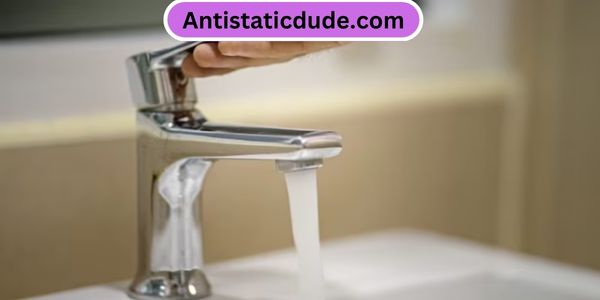Have you ever wondered if the shocking sensation you feel when touching your sink or water is caused by faulty wiring in your home? It’s a common concern that many homeowners face, but the answer might not be as straightforward as you think.
Before jumping to conclusions, consider other possible factors that could be contributing to this unsettling experience.
Stay tuned to uncover the hidden reasons behind these shocking encounters and learn how to address them effectively.

Electrical Grounding Issues
If your sink or water is giving you electric shocks, it may be due to electrical grounding issues. Electrical grounding is crucial for safety in your home.
When the electrical system isn’t properly grounded, it can lead to stray electrical currents flowing through metal pipes, causing electric shocks when you touch the water.
To resolve this issue, you should first ensure that your home’s electrical system is properly grounded. This involves checking the grounding wires in your electrical panel and making sure they’re securely connected.
If you aren’t familiar with electrical work, it’s best to hire a qualified electrician to inspect and fix any grounding issues.
Faulty Appliances or Fixtures
If your sink or water is causing you shocks, the issue might stem from faulty appliances or fixtures.
Appliances with grounding problems or fixtures with wiring issues can lead to electrical shocks when you come into contact with water.
It’s important to inspect these items to ensure they’re functioning correctly and to prevent any potential dangers.
Appliance Grounding Issue
When dealing with the issue of sink and water shocking, a common cause can be traced back to faulty appliances or fixtures lacking proper grounding.
Faulty appliances or fixtures with compromised grounding can lead to electric currents leaking into your plumbing system, causing shocks when in contact with water.
To help you identify potential problematic appliances, refer to the table below, which lists common household appliances that may be causing the issue:
| Appliance | Potential Grounding Issue |
|---|---|
| Dishwasher | Loose or damaged wiring |
| Washing Machine | Improperly grounded outlet |
| Water Heater | Faulty grounding wire |
| Garbage Disposal | Lack of proper grounding |
Fixture Wiring Problem
To address the issue of sink and water shocking potentially stemming from faulty appliances or fixtures lacking proper grounding, it’s crucial to investigate any wiring problems within these fixtures.
Faulty wiring in fixtures like sinks, showers, or any water-related appliances can lead to electric currents leaking into the water supply, causing shocks.
If your fixtures aren’t properly grounded or if the wiring is damaged, it poses a serious safety hazard.
To troubleshoot this issue, start by checking the wiring connections, ensuring they’re secure and free from any damage.
If you notice any exposed wires or signs of wear, it’s essential to have a qualified electrician repair or replace the wiring to prevent further shocks and ensure your safety.
Corrosion in Pipes
If you’re experiencing shocks from your sink, pipe material corrosion could be the culprit. Understanding the causes of corrosion and implementing preventive measures can help you address this issue effectively.
Pipe Material Corrosion
Corrosion in pipes can lead to electrical conductivity issues, causing shocks in your sink and water.
When pipe materials corrode, it creates pathways for electricity to flow through the water, increasing the risk of shocks. This can be dangerous and requires immediate attention to prevent any harm.
To address this issue effectively, consider the following:
- Regularly inspecting your pipes for signs of corrosion
- Using corrosion-resistant pipe materials
- Installing dielectric unions to prevent electrical conduction
Causes of Corrosion
Pipes in your plumbing system can corrode due to various factors, leading to potential conductivity issues and shocks in your sink and water.
One common cause of corrosion is the pH level of the water running through the pipes. Water with high acidity or alkalinity can accelerate the corrosion process.
Another factor is the presence of dissolved oxygen in the water, which can cause oxidation and corrosion of metal pipes.
Additionally, the velocity of the water flow can contribute to corrosion by wearing away protective layers inside the pipes.
Other factors like improper installation, chemical reactions with the pipe material, and high water temperatures can also exacerbate corrosion in your plumbing system, increasing the risk of shocks in your sink and water.
Preventing Corrosion Buildup
To prevent the buildup of corrosion in your plumbing system, consider implementing proactive measures to maintain the integrity of your pipes.
Here are three essential steps you can take:
- Regular Inspections: Schedule periodic inspections of your pipes to catch any signs of corrosion early on.
- Proper Maintenance: Ensure that your pipes are well-maintained by fixing any leaks promptly and keeping them clean.
- Water Quality Testing: Test the quality of your water regularly to identify any corrosive elements that may be contributing to pipe corrosion.
Water Heater Problems
If your water heater is producing strange noises or giving off a burnt smell, it could be a sign of underlying issues that need prompt attention.
Strange noises like banging, popping, or rumbling may indicate a buildup of sediment at the bottom of the tank, reducing the heater’s efficiency and potentially causing damage.
A burnt smell could suggest an electrical problem or overheating within the unit. Leaks around the water heater or pooling water beneath it are also red flags that shouldn’t be ignored.
Inconsistent water temperature or inadequate hot water supply are common problems that could stem from issues with the water heater.
If you notice fluctuations in water temperature or struggle to get enough hot water, your water heater might be malfunctioning.
Regular maintenance and timely repairs are crucial to ensure your water heater operates efficiently and safely. If you encounter any of these problems, it’s recommended to contact a professional to diagnose and address the issues promptly.
External Power Sources
Check for any external power sources that may be causing electrical interference leading to shocks in your sink and water.
It’s crucial to identify and address potential external factors that could be contributing to the shocking issue.
- Proximity to Power Lines: Ensure that your plumbing system isn’t too close to overhead power lines, as this proximity can induce electrical currents in the pipes.
- Grounding Issues: Check if your plumbing has proper grounding to prevent stray electrical currents from affecting your sink and water supply.
- Appliance Interference: Be mindful of any appliances or electronic devices near your plumbing that could be causing electrical interference and resulting in shocks.
DIY Solutions and Prevention

Considering the safety of your home and family, implementing simple DIY solutions can effectively prevent future shocks in your sink and water supply.
To address these issues, follow these practical steps:
| DIY Solution | Prevention |
|---|---|
| Inspect plumbing | Regularly check for leaks or exposed wires. |
| Install GFCI outlets | Replace standard outlets with Ground Fault Circuit Interrupter outlets. |
| Proper grounding | Ensure all electrical devices are properly grounded. |
| Call a professional | If unsure, seek help from a qualified electrician. |
| Educate family members | Teach everyone about electrical safety and what to do in case of a shock. |
Frequently Asked Questions [FAQs]
Can Water Shock From a Sink Be Dangerous for My Health?
Water shock from a sink can be dangerous for your health. It’s essential to address this issue promptly to prevent any harm. Consult a professional to ensure your safety and well-being. Stay vigilant.
How Can I Tell if My Sink Is Shocking Me Due to Faulty Appliances or Fixtures?
To determine if your sink is shocking you due to faulty appliances or fixtures, inspect for exposed wires, loose connections, or water leaks. If you suspect electrical issues, immediately shut off power and seek professional help to prevent hazards.
What Are the Signs of Corrosion in Pipes That May Lead to Water Shocking?
If you notice discolored water, a metallic taste, or leaks near pipe joints, these are signs of corrosion in pipes. Addressing these issues promptly can help prevent potential hazards such as water shocking.
Are Water Heater Problems a Common Cause of Water Shocking in Sinks?
Water heater issues can indeed cause electric shocks in sinks. Faulty wiring, grounding problems, or high mineral content in water can lead to this problem. It’s essential to address these issues promptly for safety.
Is It Possible for External Power Sources to Cause Water Shock in Sinks?
Yes, external power sources can cause water shock in sinks. Ensure proper grounding of electrical appliances near water sources. Contact a professional to inspect and fix any faulty wiring or electrical issues to prevent potential hazards.
Conclusion
Overall, experiencing shocks from your sink and water can be a dangerous and concerning issue that should be addressed promptly.
By identifying the root cause of the problem, such as electrical grounding issues or faulty appliances, you can take steps to prevent further shocks and ensure the safety of your home.
It’s important to seek professional help if needed and to always prioritize safety when dealing with electrical issues.


Leave a Reply